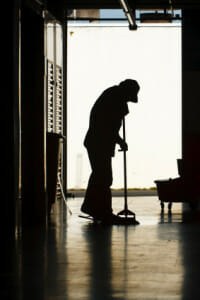“The childish propensity to intermeddle was the characteristic which the [property possessor] should have taken reasonable precautions to guard against.”* Sometimes the courts come up with lyrical gems that get right to the heart of the matter. Through pages and pages of drivel, more often than not there is one pithy sentence which sums up the whole case and rule. I often wonder why the esteemed appellate justices do not just give us the facts of the case and the one pithy sentence. The books would be a lot smaller and cases a lot clearer.**
The above quote comes from a case which held both a tenant and the janitor the tenant retained liable for personal injuries to a three-year-old. The proof was that the tenant was in charge of a school. The tenant also, in the same building, housed families. (It was a hotel, and the tenant was the United States Navy). The tenant retained a janitorial service to clean said school on the weekends. Said janitorial service did so. Sometimes, they would stack the furniture — desks and chairs — in a pile. (To make cleaning the floor easier?) One weekend, a child was present in the school. Not a stretch, considering the building also contained living quarters. He climbed up on the furniture pile and promptly fell out the window. From the fourth floor.
The case had a lot to do with outdated and inapplicable classifications of the child — whether his activity of playing on the furniture made him a “trespasser.” But the case did have confirmation of the agency liability principle, which should help exonerate the tenant for a good deal of liability for the injuries this contractor arguably caused. Here it is: “One who carries on an activity on land on behalf of the owners in possession is subject to the same liability and enjoys the same immunity from liability, for bodily harm caused thereby to others as though he were said owner.”*** Translation: the folks hired to do work on the property are not immune from liability because the owner hired them. They are liable. If they are insolvent, or cannot be located, then maybe the owner will assume their liability. If the owner also had control over the activity (arguably always?), they may have some independent percentage of fault.
*Roberts v. Del Monte Properties Co., 111 Cal. App. 2d 69, 74, 77 (1952)
**And the lawyers less numerous?
***This quote is not as pithy as the one that opened this post, but it is arguably as important.
This blog submission is only for purposes of disseminating information. It does not constitute legal advice. The statements in this blog submission do not necessarily reflect the opinions of Robinson & Wood, Inc. or its clients. No attorney-client relationship is formed by virtue of reading this blog entry or submitting a comment thereto. If you need legal advice, please hire a licensed attorney in your state.
Read more on Uncategorized
